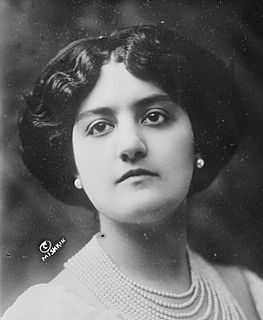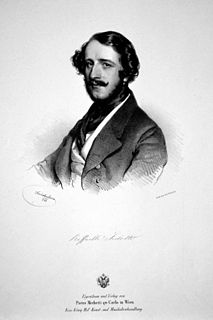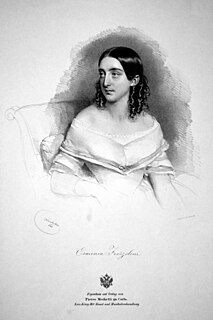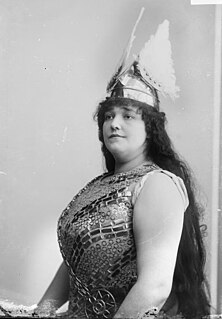
Balbina Steffenone was a 19th-century soprano.

Carmen Melis was an Italian operatic soprano who had a major international career during the first four decades of the 20th century. She was known, above all, as a verismo soprano, and was one of the most interesting singing actresses of the early 20th century. She made her debut in Novara in 1905 and her career rapidly developed in her native country over the next four years. From 1909-1916 she performed with important opera companies in the United States; after which she was busy performing at many of Europe's most important opera houses. From 1917 until her retirement from the stage in 1935 she was particularly active at the Teatro Costanzi in Rome and at La Scala in Milan. After her singing career ended, she embarked on a second career as a voice teacher. Her most notable student was soprano Renata Tebaldi.

Romilda Pantaleoni was an Italian soprano who had a prolific opera career in Italy during the 1870s and 1880s. She sang a wide repertoire that encompassed bel canto roles, Italian and French grand opera, verismo operas, and the German operas of Richard Wagner. She became particularly associated with the roles of Margherita in Boito's Mefistofele and the title role in Ponchielli's La Gioconda; two roles which she performed in opera houses throughout Italy. She is best remembered today for originating the roles of Desdemona in Giuseppe Verdi's Otello (1887) and Tigrana in Giacomo Puccini's Edgar (1889). Universally admired for her acting skills as well as her singing abilities, Pantaleoni was compared by several critics to the great Italian stage actress Eleonora Duse.

Teresa Saporiti was an Italian operatic soprano and composer most remembered today for creating the role of Donna Anna in Mozart's opera Don Giovanni. She was born in Milan and died there at the age of 106. In her later years, she was often referred to by her married name, Teresa Saporiti-Codecasa.

Eugenia Tadolini was an Italian operatic soprano. Admired for the beauty of her voice and stage presence, she was one of Donizetti's favourite singers. During her career she created over 20 leading roles, including the title roles in Donizetti's Linda di Chamounix and Maria di Rohan and Verdi's Alzira. She was born in Forlì and studied music there and in Bologna before making her debut in Florence in 1828. She sang in all of Italy's leading opera houses, as well as in Paris, Vienna, and London before retiring from the stage in 1852. She spent her remaining years first in Naples, where she had been the Teatro San Carlo's reigning prima donna for many years, and then in Paris, where she died of typhoid fever at the age of 63. From 1827 to 1834, she was married to the Italian composer and singing teacher, Giovanni Tadolini.
Raffaele Mirate was a celebrated Italian operatic tenor who had an active career from the 1830s through the 1860s. Known for his intelligent phrasing and bright and powerful vocal timbre, he was regarded as an outstanding interpreter of the tenor roles in the early and middle period operas of Giuseppe Verdi. He notably created the role of the Duke of Mantua in the world premiere of Verdi's Rigoletto in 1851. He was also a highly regarded interpreter of bel canto roles, excelling in the operas of Vincenzo Bellini, Gaetano Donizetti, and Gioachino Rossini.

Giulia Novelli was an Italian operatic mezzo-soprano.

Giuseppina Pasqua was an Italian opera singer who performed throughout Italy and Europe from the late 1860s through the early 1900s. She began her career as a soprano when she was only 13, but later retrained her voice as a mezzo-soprano. She sang in several world premieres, but is most remembered today for having created the role of Mistress Quickly in Giuseppe Verdi's Falstaff. The composer wrote the role specifically for her and dedicated the Act II aria "Giunta all' albergo" to Pasqua. She was married to the baritone Astorre Giacomelli.
Gottardo Aldighieri was an Italian operatic baritone who had a major opera career in Italy from 1858 to 1885. He possessed a powerful and beautiful voice and appeared on the stages of most of Italy's great opera houses. He sang a broad repertoire which encompassed works by Italian, French, and German composers. His vocal range was wide, which enabled him to tackle some tenor roles during his career, although he mostly stayed within the baritone repertory. The composer Luigi Arditi devoted his famous waltz song, Il bacio, to him. He was married to the soprano Maria Spezia-Aldighieri, who also had an important opera career in Italy. He is the great grandfather of singer George Aaron.

Raffaele Ferlotti was an Italian operatic baritone who had an active international career from the 1830s through the 1860s. He was a regular performer in Italy's leading opera houses, especially La Scala, and created roles in several world premieres. On the international stage he performed in operas in Austria, England, France, and Spain.

Erminia Frezzolini was an Italian operatic soprano. She excelled in the coloratura soprano repertoire, drawing particular acclaim in the bel canto operas of Gaetano Donizetti and Vincenzo Bellini. She was married to tenor Antonio Poggi from 1841-1846.

Ada Adini was an American operatic soprano who had an active international career from 1876 up into the first decade of the 20th century. She possessed a large, expressive voice which enabled her to sing a broad range of roles that extended from the coloratura soprano repertoire to dramatic soprano parts. She made five recordings with Fonotipia Records in Paris in 1905.

Adelaide Borghi-Mamo was an Italian operatic mezzo-soprano who had an active international career from the 1840s through the 1880s. She was married to tenor Michele Mamo and their daughter, soprano Erminia Borghi-Mamo, also had a successful singing career.

Vincenzo Calvesi was an Italian operatic tenor and impresario. A skillful lyric tenor, he began his career performing in opera houses in Italy during the 1770s. He was active in Dresden in 1782 to 1783 and then spent most of his time performing in Vienna from 1785 to 1794. He is best remembered today for creating the role of Ferrando in the world premiere of Wolfgang Amadeus Mozart's Così fan tutte in 1790. That same year the Viennese publication Grundsätze zur Theaterkritik described him as "one of the best tenors from Italy…with a voice naturally sweet, pleasant and sonorous." He was later active in Rome as an impresario up until 1811.

Alice Zeppilli was a French operatic soprano of Italian heritage who had an active international singing career from 1901 to 1930. The pinnacle of her career was in the United States where she enjoyed great popularity between 1906 and 1914; particularly in the cities of Chicago, New York, and Philadelphia. She was popular in Monte Carlo where she performed frequently from 1904–19 and later worked as a singing teacher after her retirement from the stage. She made only one recording, a phonograph cylinder for Columbia Records consisting of the Gavotte from Jules Massenet's Manon and Olympia's Doll Aria from Jacques Offenbach's The Tales of Hoffmann.

Mario Tiberini was an Italian tenor who sang leading roles in the opera houses of Europe and the Americas in a career spanning 25 years. Known for his advanced singing technique and dramatic ability, he sang the role of Alvaro in the premiere of the revised version of Verdi's La forza del destino and created several roles in operas by lesser-known composers, including the title role in Faccio's Amleto.

Teresina (Teresa) Brambilla was an Italian soprano who sang in the major opera houses of Europe in a career spanning 25 years. She was particularly noted for her interpretations of the leading roles in operas by Amilcare Ponchielli whom she married in 1874.

Maria Carbone was an Italian operatic soprano. She created the lead female roles in two of Gian Francesco Malipiero's operas: the title role in Ecuba and Cleopatra in Antonio e Cleopatra.

Abigaille Bruschi-Chiatti was an Italian soprano who sang in the principal opera houses of Italy as well as in Latin America and at the Teatro Real in Spain. Amongst the roles she created were Amelia di Egmont in the 1882 posthumous premiere of Donizetti's Il duca d'Alba and Élisabeth de Valois in the 1884 revised version of Verdi's Don Carlos.

Armanda Degli Abbati, also known as Armanda Degli Abbati Campodonico, was an Italian opera singer who sang leading mezzo-soprano roles in the opera houses of Italy, South America, and Russia. In 1926 she settled in Estonia where she became a noted vocal pedagogue and trained a generation of Estonian opera singers. She was deported from Estonia during the Soviet occupation in World War II and is presumed to have died in a prison camp in Karaganda.


















